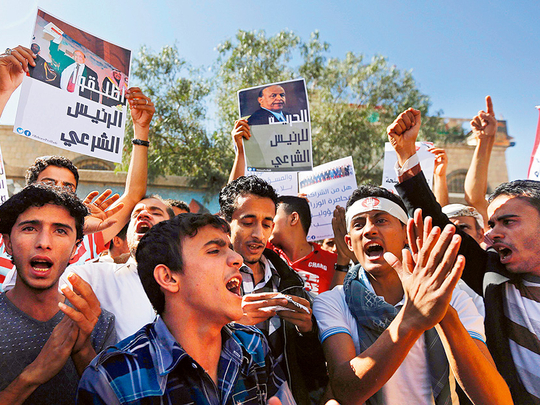
Sana’a: Al Houthi leaders agreed on a compromise legislative council Friday, according to a UN mediator, but the move fell far short of the goal of forming a new government and choosing a leader.
Yemen has been without a government since Jan. 22, when President Abed Rabbo Mansour Hadi and his entire Cabinet resigned under pressure from Al Houthis, who had taken control of the capital and much of the country’s military.
Jamal Bin Omar, the UN mediator who has been leading talks between Al Houthis and other political groupings, said that the formation of the council was not a final agreement, but that it nevertheless represented “an important breakthrough that paves the way toward a comprehensive agreement,” a statement released by his office said.
The compromise would keep the existing parliament in place but add a “people’s transitional council” as, in effect, an upper legislative chamber. That council would comprise members drawn from Al Houthis as well as from other groups that are underrepresented in the traditional parliament, including young people, women and people from southern Yemen.
That represents a significant concession by Al Houthis, who had declared their intention to dismiss parliament and replace it with members of their revolutionary committees. They have insisted they do not want to dominate the country but just want a share of power in a new government, which they do not feel they had previously.
The new council, along with the old parliament, would together enact legislation to guide a transition to a new government, Bin Omar said. Still unresolved is how to choose a new president or replace the Cabinet. Hadi and many of his Cabinet members remain under house arrest, despite a resolution by the UN Security Council last week demanding their release.
Bin Omar’s statement indicated that the parties would continue their efforts to reach a comprehensive settlement on choosing a president and Cabinet and providing security and political guarantees.
“Full agreement will not be announced until there’s a full agreement on all those issues,” Bin Omar said.
In an interview last Saturday, Bin Omar said the political negotiations were complicated.
“Any agreement to get out of this mess will have to involve a high degree of consensus among all the political parties,” he said. “Building consensus takes time.”
Bin Omar warned that the situation was urgent, however.
“Since the takeover of Sana’a by Al Houthis, centrifugal forces are now at play both in the south and other parts of the country, demanding separation,” he said.
North and South Yemen were separate countries for many years and Al Houthis, members of a northern tribal confederation, are deeply unpopular in the south.
Yemen, the poorest country in the Middle East, is heavily dependent financially on aid from Western donors and the World Bank, especially since Saudi Arabia’s decision last year to end its $4 billion in aid - more than any other country - after Al Houthis took control of the capital. The World Bank officially closed its office in Sana’a for one month beginning Wednesday, said a spokesman for the bank, William Stebbins.
Stebbins said the World Bank was assessing the impact on its operations of political developments in the country. In the meantime, World Bank missions to the country were suspended as well, he said. The World Bank provides Yemen with $1.1 billion in assistance.












